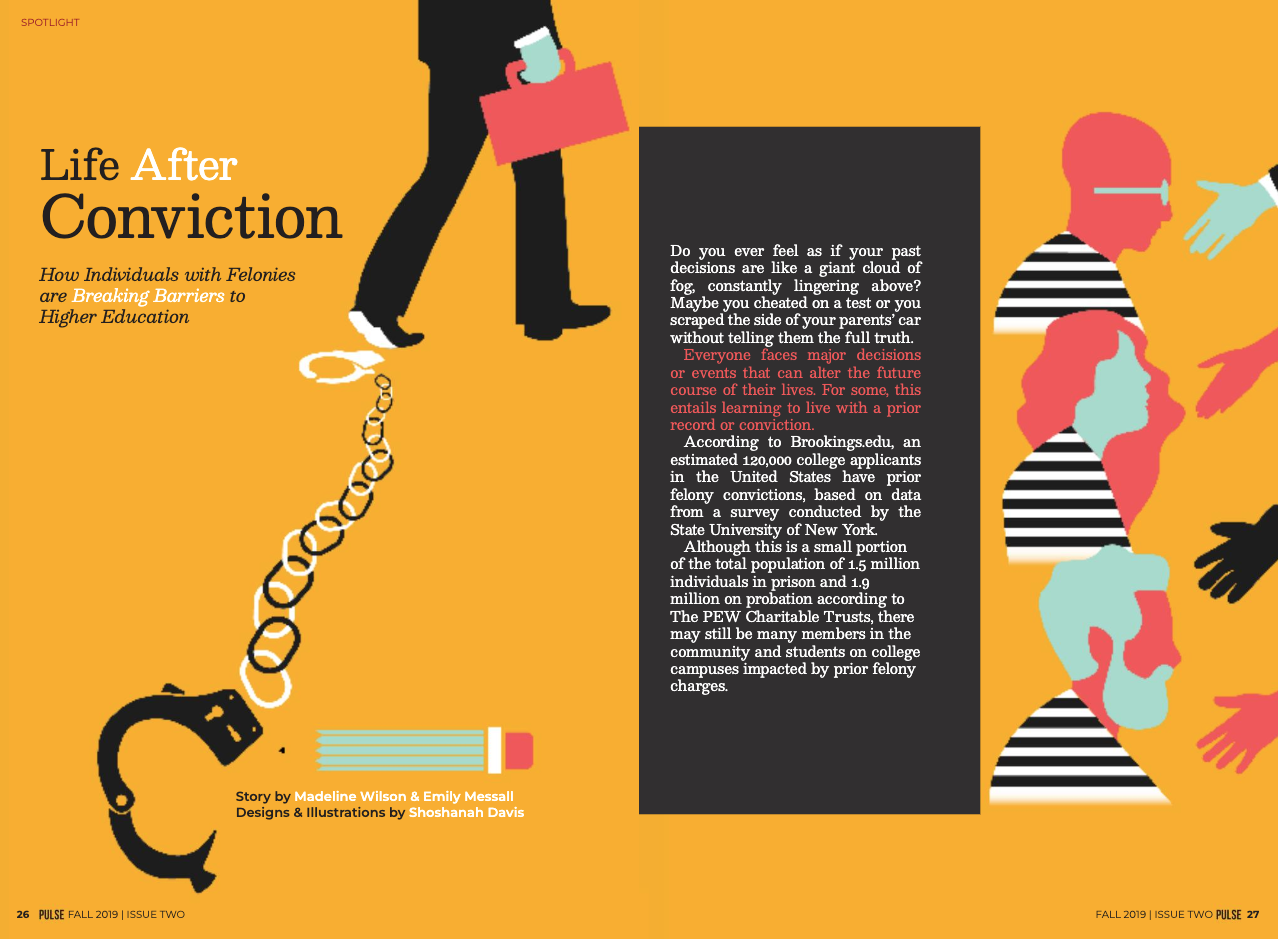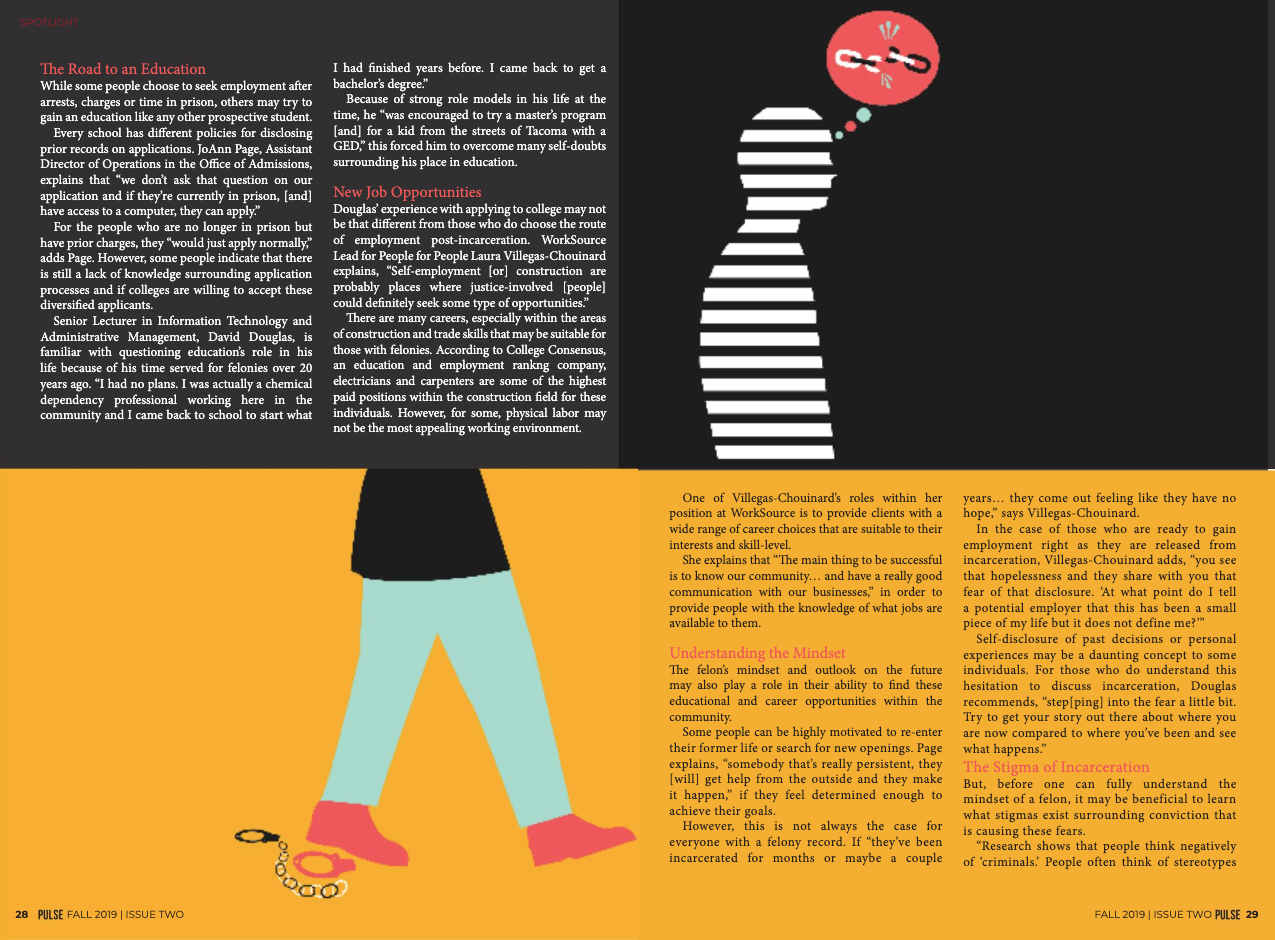Life After Conviction: How Individuals with Felonies are Breaking Barriers to Higher Education
Story by Madeline Wilson & Emily Messall | Designs & Illustrations by Shoshannah Davis
Do you ever feel as if your past decisions are like a giant cloud of fog, constantly lingering above? Maybe you cheated on a test or you scraped the side of your parents’ car without telling them the full truth.
Everyone faces major decisions or events that can alter the future course of their lives. For some, this entails learning to live with a prior record or conviction.
According to Brookings.edu, an estimated 120,000 college applicants in the United States have prior felony convictions, based on data from a survey conducted by the State University of New York.
Although this is a small portion of the total population of 1.5 million individuals in prison and 1.9 million on probation (The PEW Charitable Trusts), there are still many members in the community and students on college campuses that may be impacted by prior felony charges.
The Road to an Education
While some people choose to seek employment after arrests, charges or time in prison, others may try to gain an education like any other prospective student.
Every school has different policies for disclosing prior records on applications. JoAnn Page, Assistant Director of Operations in the Office of Admissions, explains that “we don’t ask that question on our application and if they’re currently in prison, [and] have access to a computer, they can apply.”
For the people who are no longer in prison but have prior charges, they “would just apply normally,” adds Page. However, some people indicate that there is still a lack of knowledge surrounding application processes and if colleges are willing to accept these diversified applicants.
Senior Lecturer in Information Technology and Administrative Management, David Douglas is familiar with questioning education’s role in his life because of his time served for felonies over twenty years ago. “I had no plans. I was actually a chemical dependency professional working here in the community and I came back to school to start what I had finished years before. I came back to get a bachelor’s degree.”
Because of strong role models in his life at the time, he “was encouraged to try a master's program [and] for a kid from the streets of Tacoma with a GED,” this forced him to overcome many self-doubts surrounding his place in education.
New Job Opportunities
Douglas’ experience with applying to college may not be that different from those who do choose the route of employment post-incarceration. WorkSource Lead for People for People Laura Villegas-Chouinard explains, “Self employment [or] construction are probably places where justice-involved [people] could definitely seek some type of opportunities.”
There are many careers, especially within the areas of construction and trade skills that may be suitable for those with felonies. According to College Consensus, electricians and carpenters are some of the highest paid positions within the construction field for these individuals. However, for some, physical labor may not be the most appealing working environment.
One of Villegas-Chouinard's roles within her position at WorkSource is to provide clients with a wide range of career choices that are suitable to their interests and skill-level. She explains that “The main thing to be successful is to know our community… and have a really good communication with our businesses,” in order to provide people with the knowledge of what jobs are available to them.
Understanding the Mindset
The felon’s mindset and outlook on the future may also play a role in their ability to find these educational and career opportunities within the community.
Some people can be highly motivated to re-enter their former life or search for new openings. Page explains, “Somebody that’s really persistent, they [will] get help from the outside and they make it happen,” if they feel determined enough to achieve their goals.
However, this is not always the case for everyone with a felony record. If “they’ve been incarcerated for months or maybe a couple years...they come out feeling like they have no hope,” says Villegas-Chouinard.
In the case of those who are ready to gain employment right as they are released from incarceration, Villegas-Chouinard adds, “you see that hopelessness and they share with you that fear of that disclosure. ‘At what point do I tell a potential employer that this has been a small piece of my life but it does not define me?’”
Self-disclosure of past decisions or personal experiences may be a daunting concept to some individuals. For those who do understand this hesitation to discuss incarceration, Douglas recommends, “step[ping] into the fear a little bit. Try to get your story out there about where you are now compared to where you’ve been and see what happens.”
The Stigma of Incarceration
But, before one can fully understand the mindset of a felon, it may be beneficial to learn what stigmas exist surrounding conviction that is causing these fears.
“Research shows that people think negatively of ‘criminals.’ People often think of stereotypes such as low socioeconomic status and minority race… and associate negative personality traits with the word ‘criminal,’” according to the article “Jail Inmates’ Perceived and Anticipated Stigma: Implications for Post-release Functioning” found on the PubMed Central archive of the National Institutes of Health’s National Library of Medicine.
When people are faced with employers that disqualify them from positions based on these assumptions, “That confidence level is almost unintentionally ripped from them for whatever caliber of incarceration they faced,” says Villegas-Chouinard.
Yet there are some ways in which people, including felons, can work toward breaking that barrier within society.
“We do as an institution, as a community, as a society, need to continue working toward lowering the stigma… toward people who have had convictions, because people’s lives do change,” Douglas recommends. “We cannot continue to punish someone years after they’ve served their sentences or paid their fines… and they want to be [a] part of [the] communities they live in, but they can’t because of something that happened years ago.”
Local non-profits, charitable organizations and even businesses may also play a role in removing this stigma. When collaborating with these local companies, “It’s just the communication that can make or break an opportunity or remove that helplessness,” explains Villegas-Chouinard.
Lastly, it may not only be important to collaborate with organizations and businesses in providing this information, but also to remove that wall between identifying as a felon versus a person.
Villegas-Chouinard advises, “I can safely say we’re all driving our own bus and things that happen in one’s life shouldn’t define them.”


